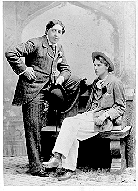A Celebration for Oscar
Published: 2008Updated:|
A CELEBRATION FOR OSCAR More than a century
after his release from prison,
England today is celebrating its first public memorial to Oscar Wilde.
Placed in Adelaide Street, near London's Trafalgar Square, the bronze
monument was filmmaker Derek Jarman's idea.
Was Wilde gay? You bet. Was he a boy-lover? Damned right.
After serving his sentence, Wilde left England for a bitter exile in Europe - never to return. He said, "All trials are trials for one's life, just as all sentences are sentences of death; and three times have I been tried. ... The one disgraceful, unpardonable, and to all time contemptible action of my life was to allow myself to appeal to society for help and protection." Wilde wrote that "Society, as we have constituted it, will have no place for me, has none to offer; but Nature, whose sweet rains fall on unjust and just alike, will have clefts in the rocks where I may hide, and secret valleys in whose silence I may weep undisturbed. She will hang the night with stars so that I may walk abroad in the darkness without stumbling, and send the wind over my footprints so that none may track me to my hurt: she will cleanse me in great waters, and with bitter herbs make me whole." - De Produndis A century after he was made a scapegoat,
England
is celebrating Wilde's life. Chris Smith comments, "It's due to Oscar
Wilde in many ways that we today can celebrate a society that generally
appreciates diversity and the richness of diversity in our community."
Wilde: "The Love that dare not speak its name" in this century is such a great affection of an elder for a younger man as there was between David and Jonathan, such as Plato made the very basis of his philosophy, and such as you find in the sonnets of Michelangelo and Shakespeare. It is that deep, spiritual affection that is as pure as it is perfect. It dictates and pervades great works of art like those of Shakespeare and Michelangelo, and those two letters of mine, such as they are. It is in this century misunderstood, so much misunderstood that it may be described as the "Love that dare not speak its name," and on account of it I am placed where I am now. It is beautiful, it is fine, it is the noblest form of affection. There is nothing unnatural about it. It is intellectual, and it repeatedly exists between an elder and a younger man, when the elder man has intellect, and the younger man has all the joy, hope and glamour of life before him. That it should be so, the world does not understand. The world mocks at it and sometimes puts one in the pillory for it." [The speech caused a loud burst of applause to erupt from the gallery of the courtroom.] ~ Oscar Wilde, playwright The story of the trial of Oscar Wilde can be found in an excellent small book, The Early Homosexual Rights Movement (1864-1935), by John Lauritsen and David Thorstad, published by Times Change Press, New York.
|


 At the height of late-Victorian British
Empire, Wilde's brilliant writing challenged smugness and prejudice,and
took on the establishment with amazing wit. However, his most
unpardonable transgression was to be seen in public with rude boys,
violating the behavioral class norms of his day. Society got its
revenge.
At the height of late-Victorian British
Empire, Wilde's brilliant writing challenged smugness and prejudice,and
took on the establishment with amazing wit. However, his most
unpardonable transgression was to be seen in public with rude boys,
violating the behavioral class norms of his day. Society got its
revenge. 
